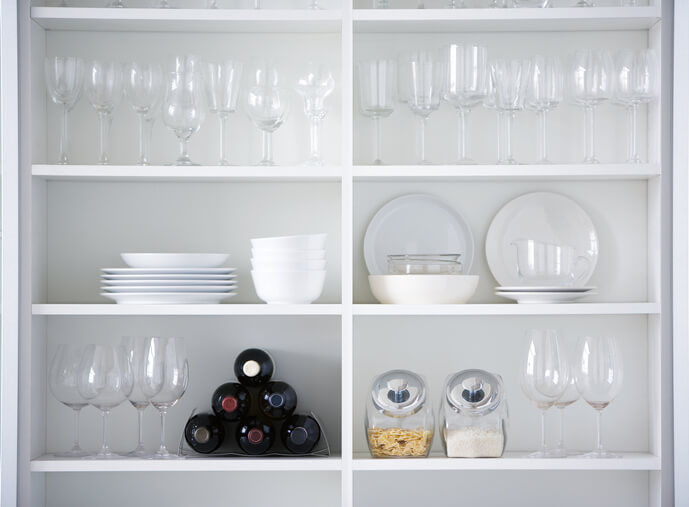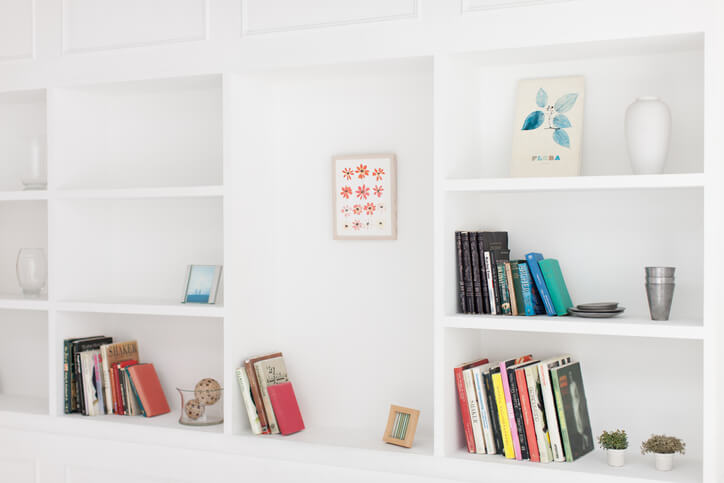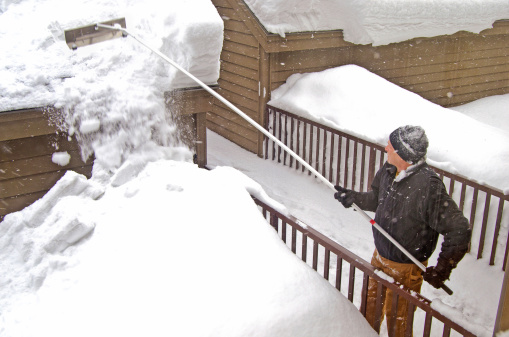There are many reasons why you might choose to declutter your home and whittle down your belongings. Perhaps you’re planning to move into a smaller and more manageable home. Or you’re preparing to devote more of your time and money to traveling, seeing family or having new experiences rather than shopping for—and maintaining—more stuff.
If you’re figuring out how to sell your house fast, getting rid of those personal items for staging may prove helpful. Or you could be one of the millions of people intrigued by popular minimalist trends, inspired by bestseller Marie Kondo or by the phenomenon that is Swedish Death Cleaning.
But when you set out to declutter an entire home, especially one in which you’ve accumulated possessions over decades, it can be overwhelming and hard to decide what to focus on or where to start. If that’s where you are in the downsizing process, working your way through the following categories—in whatever order appeals to you—will get you well on your way to a downsized home and a new perspective on what you really need.
11 Steps to Declutter Your Home
1. Clothing, Shoes and Accessories
The closet is often the first place people turn to for decluttering their home. There’s just something satisfying about clearing out unworn clothes, shoes and accessories. But although the result is rewarding, downsizing your wardrobe can be tough. You might be holding on to clothing that represents a former career, a size you no longer wear or the guilt that accompanies having invested in pricey pieces you didn’t get much use out of. But a move or other new adventure is the perfect time to overcome these obstacles.
To seriously reduce the size of your wardrobe, assess every item—even the small things like T-shirts, socks and jewelry—and get rid of anything that you wouldn’t wear right now (if the weather and occasion were appropriate). Get rid of anything that doesn’t fit, physically or otherwise. If you’re moving, pay special attention to whether your clothing will work in your new location. If you’re moving because of a new job or retirement, factor in your new daily lifestyle, too.
2. Furniture and Home Décor
Even if it’s easy for you to part with a stretched-out sweater or too-tight pair of shoes, it can feel wasteful to get rid of large household items like your:
- Couch
- Chairs
- Coffee table
- Dining room table
- End or side tables
These items take up lots of space, can be costly to replace and often have been in your home for many years.
But don’t let that stop you from honestly evaluating your furniture, along with decorative pieces like artwork. Ask yourself whether you still use or truly enjoy each item. Determine what items fit with your current lifestyle and, if you’re moving, ask yourself if you’ll need them in your new home. Keep in mind that transporting large, heavy items can sometimes cost as much as buying new ones and can be key for decluttering your home.

3. Hobby Equipment
If you’ve ever gotten interested in fitness, painting or any other activity that requires special equipment, you’ve probably accumulated a stash of stuff you no longer use. But if you gave up knitting in 1993, it’s time to admit you don’t need boxes full of needles and yarn anymore. This can be surprisingly difficult because you likely bought many of these items either as part of a self-improvement project or a real passion. We truly intend to learn the guitar. We really want to be the kind of person who rides an exercise bike every day. And no one wants to be the kind of person who sheepishly drops off their unused yoga mats at Goodwill.
A more useful way to think about this unused stuff is that there’s nothing wrong with trying something new and realizing it didn’t work for you. It’s far better than never having had an interest in the first place. Plus you probably learned something about yourself in the process. You may have since found an activity you enjoy more. If not, you may find one in the future. But holding on to the tools of an abandoned hobby doesn’t move you any closer to that future. Let them go and make room for an activity you’ll feel motivated to do.
4. “Junk Drawer”
Even the neatest of households can unwittingly accumulate:
- Dry ballpoint pens
- Single socks
- Broken gadgets no one will ever repair
- Assorted thingamajigs of uncertain origin
If you want to declutter your home and don’t know where to begin downsizing, this is a safe place to start. It is probably the quickest, easiest and most immediately satisfying category to declutter. Cleaning out your junk is a relatively mindless project that lacks the emotional or logistical decisions that can slow you down in other areas.
You can tackle your junk by dividing your space into sections. Clearing out a desk or small room might take just minutes. Or you can dedicate a day or weekend to walking through your house, garbage bag in hand, searching for caps that fit no bottle, buttons that match no coat or any other extra bits and pieces you don’t need.
5. Duplicates and Backups
Not everyone will have a lot in this category, but if you’re a “just in case” type or a “buy it in every color” shopper, you might have closets full of things you’ll never use. Some backups are good to have around. It’s only logical to stock some extra paper towels, batteries and pantry staples. But this tendency can get out of hand when it leaves your space cluttered with goods you don’t really need. And that’s especially true if you’re getting ready to pack and move.
Items to get rid of in this category include unused or expired:
- Foods
- Medications
- Vitamins
- Beauty products
Check their labels, because many of these often expire faster than you’d think. Also, look out for frequently misplaced items like umbrellas and reusable shopping bags. It’s handy to have multiples of these, but it’s also easy to accumulate too many. You may also encounter duplicates in your clothing, kitchen items or other categories. Recognizing them as such will help you part with them. If you’re moving, getting rid of backups you don’t need will help make packing and unpacking easier. It can also help you get away from a clutter-creating mentality.
6. Kitchen and Dining Gear
Some kitchen and dining items that are the most fun to buy are also the least enjoyable to declutter, like:
- Cookware
- Gadgets
- Dishes
- Coffee mugs
They’re fragile, heavy and useful (unless they’re broken), so it can be hard to justify giving them away. Plus, like clothing and hobby equipment, they sometimes represent a phase of life that’s over. For example, wine glasses for those cocktail parties you used to throw or specialized tools for those elaborate meals you once thought you’d enjoy making.
But having more kitchen goods than you need leads to serious clutter and having to bring them all with you when you move is a bubble-wrapped nightmare. Unless the unused item is a beloved heirloom, pass it on to someone who will use it. After all, you can always find another spiralizer if you feel the need to make zoodles someday.

7. Home Linens
Even if you never intend to, it’s easy to hoard bulky inhabitants of the linen closet, like:
- Sheets
- Blankets
- Towels
- Throw rugs
You start out needing extras for guests and cold nights, or wanting to change the look of a room. Before you know it, you’ve got a closet full of soft, cozy clutter. To declutter your home, discard any items that are torn, stained or badly frayed. Then get rid of any items you don’t use, whether it’s because you don’t like them, or you simply don’t need them anymore.
If you’re moving soon, think about the number of boxes—and the amount of space in a moving truck—unnecessary linens can occupy. And of course, if you’re moving from a five-bedroom house to a two-bedroom condo, you won’t need as many pillows and blankets. If you’re moving from the coast to the mountains, you probably won’t need that many beach towels.
8. Outdoor Equipment
You might not think of this category as a potential clutter zone. It’s easy to ignore outdoor items when you’re not using them, like:
- Lawnmowers
- Garden tools
- Outdoor furniture
- Decorative items
Because they’re usually stored not in the house but in a garage or shed, you might forget you even have them. They’re easy to buy, stash away and put out of your mind. So, you may wind up with a collection of outdoor equipment far beyond what you really need. But one of our top tips for how to declutter your home is to let go of anything that doesn’t function properly or that you haven’t used in a few years.
If you’re moving, consider whether you’ll need the same tools and toys in your new space, climate and lifestyle. You might balk at parting with larger, more expensive items if there’s even a small chance you’ll use them someday. But, as with furniture, it can sometimes be financially and logistically easier to find new items that better fit your needs once you’ve reached your new location.
9. Memorabilia
Nearly everyone keeps some treasured memories of the past, like an album of family photographs or a collection of personal letters. Most people also have collected quite a bit of less meaningful memorabilia—items they never intended to save but don’t feel quite right about discarding. This could include birthday cards from relatives, souvenirs from long-ago vacations and anything that blurs the line between keepsake and clutter.
There are two ways to handle this sort of unintentional collecting. The first is to save the items, or a select few of them, in a manner that reduces the space they take up. For example, you can scan those nostalgic birthday messages before tossing the paper cards. The other is to train yourself to think differently about the significance of physical objects. You don’t need old ticket stubs or fridge magnets to remember the shows you’ve seen or the places you’ve visited.
10. Long-Term Storage
Most of us have items that we keep in some form of long term storage. Getting rid of them can go a long way when it’s time to declutter your home. These items often live in a basement, attic or storage unit. Unlike the memorabilia mentioned above, they once served a real purpose. They are often documents, like bank statements or college notes. But they can also be toys from your grown children’s youth or high school yearbooks. It can be hard to simply shred or donate these items, even if you haven’t looked at them in 20 years. And yet, you probably don’t want to store them for the rest of your life, especially if you’re about to move.
To pare down these items, start with anything that doesn’t belong to you. Ask your kids if they want their things, like:
- Old books
- Papers
- Stuffed animals
They may come and get them. They also may give you the green light to toss everything. Then, determine if anything important is lurking in the remaining clutter. You can digitize many documents you need to keep to save space. As for anything you don’t need, ask yourself if it makes you truly happy knowing it’s stored in your home. Also, be honest about whether you’ll ever really go rummaging through those boxes for a memory. If the answers indicate that the stuff isn’t a meaningful part of your life anymore, it might be a good time to give it up.
11. Books
If you’re moving, you might not want to cart hundreds of heavy volumes with you. If you’re working towards living a more streamlined life, it may suddenly strike you as wasteful to be hanging on to all those books. Maybe you even have textbooks collecting dust from college courses decades ago.
To declutter your home and pare down your personal library, start by going through your books one by one. It’s tedious, but it’s worth it and can even be fun when it leads to surprise literary re-discoveries. With each book, ask yourself the following questions:
- Will I read this again?
- Do I need this as a regular reference for work or life?
- Is the same information now available online where I can access it just as easily?
- If I lost this book, would I notice?
- Would I try to replace it?
- Would it be easy and affordable to replace?
- Do I really enjoy owning this book, or am I just keeping it to remember that I read it?
- Is this book meaningful to me as I am today, or is it a more of a souvenir of another time in my life?
- Is it truly a cherished keepsake or simply an old item I no longer need?
- Do I have duplicate copies of this and is there a reason I need more than one?

Who Will Take My Unwanted Books?
Some people hang on to old books because they don’t know how to dispose of them. If that’s you, here are some of options:
- Many libraries accept donations of books, usually for fundraising sales.
- Some used bookstores will buy books. They may also offer to donate for you the ones they can’t buy.
- For rare or antiquarian books, search for dealers in your area who may or may not be associated with a brick and mortar bookshop.
- If it’s permitted in your city, try setting your books out on the sidewalk with an eye-catching “FREE” sign.
- Seek out a Little Free Library near you or start one yourself.
- Inquire whether your local resale and thrift stores accept donations of books.
- Have a tag sale and include a book section with attractive pricing.
- Gift books to friends and family members in accordance with their tastes and interests.
- Find out whether a school, prison, shelter or community center in your area would welcome donated books.
- There are many nonprofit organizations that facilitate the donation of your books to readers around the world. Just do some searching online to find one whose mission and method works for you.
Conclusion
To declutter your home or decluttering a home to move can be both stressful and exciting. It’s also the perfect time to embrace one of the key lessons of decluttering: Many possessions come into your life for a specific period. When that season is over, and their usefulness and value to you are gone, you can feel free to let them go—to help make room for your adventures that are still to come.







Tried to lessen my load of stuff collected over 60 years, and that is not easy to do. Any help you offer will be great.
Thank you for sharing indeed great looking !
When I lost my husband and then lost my live-in mother 6 months later I was a mess. Matters got worse when I couldn’t maintain my home on my own and had to sell and downsize. Having all of their personal items I felt I couldn’t rid of anything, but had to. So, I got out my phone and made a digital file and took photos of everything I knew I couldn’t take with. I will now have them forever. I was able to sell or donate without all the guilt. Whenever I feel the need I look at the photos which I now find very comforting.
Great job! This is an insightful story. Thank you very much for posting. Will keep following your posts.
De clutter article was v. Helpful. I will start with the closet!
AARP magazines & nutrition news letters are all over the place.
They are very informative. Who can use them?
Thank you so much for your article.
Mohini Venkatesulu.
So disappointed to learn about Goodwill’s policy. Wish I had known before donating clothing and Hoover vacuum cleaner with accessories. I will look into charities in advance hereafter.
Local animal shelters and rescues will take all towels, sheets and blankets. Find a “local” thrift store to donate to. Most will come and pick up larger items. The money from these stores stay in your community and assist with the agencies they are attached with. I collect magnets from my trips. I have framed a thin piece of metal that hangs on a wall, all of my magnets are on it. I AM at the point that I may need to make another one. The grandkids still like to play with them and ask questions so I get them down for them. As for crafting supplies, try contacting local nursing homes and prison facilities. We have a prison here (men’s) that actually teaches them how to sew and quilt. You also might want to contact a local elementary school to see if they would use any of your craft supplies, in particular card making and yarn items.
Great suggestions!
I made a copy of this article and I’m going to get started right away. The Hartford is an amazing company. Thank you for your wonderful, helpful articles and fun, brain-challenging games!
Pamela – Thanks for being a customer and reading the blog. We’re so glad you’re enjoying it. Happy New Year!
I totally agree with how “classy” Hartford is! So glad I switched my home and auto insurance to them and never dreamed such useful information comes along with the other insurance policies. 😻😳
Andy – Thanks for your kind words. We’re glad you’ve been happy with The Hartford. Thanks for being a customer and an Extra Mile reader.
Goodwill industries used to be a great place to donate to.
It was also a great place to shop if you live on limited funds.
They even used to donate to needy persons or families.
But as they have become a “FOR PROFIT” business their prices on donated items have jumped to “OUTRAGEOUS” !
I had seen used donated items priced higher than new retail.
I no longer shop Goodwill stores.
Salvation Army on the other hand seems to be a great place to get a good deal on items you may need.
And they accept and try to resell about anything.
DAV ( Disabled American Veterans ) is generally a good place to donate to as well as shop.
But remember, somethings are just broken, missing parts, wornout or beyound repair .
So be honest with yourself and let um go to the Dumb, landfill or scrap yard.
I am a disabled Viet Nam Vet who grew up in a well fair family.
I am a certified Hoarder.
I know how hard it is to get shed of stuff.
But there comes a time when it MUST be done !
When you build a shed just to have more space to store your stuff, it’s time to rethink your stuff.
Let It Go !
I am working on a 25 year long collection of Things that need to go !
I used to search for encyclopedia yearbooks. I would give them as birthday gifts for the year of someone’s birth, or marriage. What was going on in the world the year you were born? The encyclopedia yearbook is a treasure of information that many people are surprised to discover. Recently these yearbooks have become much harder to find.
Good idea if I can make myself do it
thanks for the tips
Thanks for the explanation.
Love my ins.
Very helpfull.
This article was very informative 👏 👍. I also had a set of Britannica encyclopedias very old but like new. Really had a hard time getting the
library and the thrift stores to take them. Luckily for me one of my grandsons
knew someone were he works who likes to read and do research on everything
was interested in taking them. I wish I had seen this article before and I would of had more avenues to look into. Thanks so much for sharing this with all of
us.And thanks 😊 to the bloggers for giving their input.
“Dgt” is just an abbreviation for “daughter.”
I see many suggestions of donating to Goodwill. Where I live, Goodwill will toss in their dumpster everthing they don’t have room for. I saw this for myself while I was there dropping off my donations. I was VERY upset by what I saw and from that time on, I will ONLY donate to the Salvation Army store or to other local thrift shops. I fully support Salvation Army and the work they do, especially by donating needed items and clothing to people that live in areas that have been devastated by storms, floods, fires, etc. To my knowledge, Goodwill doesn’t do that.
I also have seen Goodwill donation sites that left huge bins full out in the rain! I go to one with a covered area.
My fav is a local charity that outfits families they have found housing for AND has a shop to resell fancy stuff. I see trucks going out to families while I am there donating household items. Check what their cause is and donate to one you support. (Community Warehouse, Portland, Oregon)
This was a godsend to me. I went into my garage today to load up brand new kitchen cabinets I brought to my home in 2004 to furnish an apartment next door. I had changed my mind and furnished it with antique pieces, and the eight cabinets plus range hood were just sitting there, preventing me from garaging a car. I am taking them tomorrow to the Rehab store for Habitat For Humanity, to be appreciated by someone. Then I’m going to tackle the boxes of other things I brought with me when I moved in 2007 and haven’t used since!
I found out recently that the Goodwill store in my area sells free goods at a profit, but less than one eighth of that profit actually goes to the job-related programs they market as their primary charity. I don’t donate to them any longer. There are other charities out there that do what they say. You have to research carefully if you want your items to make a difference for families that truly need help instead of those making a profit on a registered “non-profit” charity.
Read some very helpful ideas on decluttering, including donations to animal shelters. One comment mentioned “dgt”. I am not familiar with this term.
Dgt. Is a more recent abbreviation for daughter. I thought so, but Googled it to be sure.😁
I was puzzled too, but i think the writer meant “daughter”.
Re: the “dgt” acronym, I believe it means…
“Doing Good Things”.
I saw it once before somewhere.
Assume it’s daughter
I love the color scheme in your pictures-peaceful and beautiful tones. My son is a painter and these are colors he can do my living room.
I have donated so much in the past and no more donations only to those who truly love and need my items.
I am retired so I need any extra income possible.
I have spent months checking prices on my collectibles and there are really no honest dealers out there. I am not looking for a huge amount for my goods but i have spent a lifetime collecting and it would take a lifetime for dealers to gather my goods,
Your info was very informative and great for the person who truly wants to get rid of
everything,
I enjoyed this website about clutter it made me get up and go into my kitchen and linen closet and I did donate to Goodwill
Nice job Joanne!
Animal rescue places and shelters can always use old towels and wash cloths.
Since we moved from Allstate to Hartford there have been several very interesting and helpful presentations offered. Keep them up, especially in the area of health.
GOOD READ
Thanks, Ceci!
We have Goodwill in Calif. that takes just about everything. I took two boxes today, one of just books and the other kids toys.
Great advice Barbara, thank you!
Blankets and comforters, cleaned, are great donations to animal shelters.
I give my in good condition discards to my dgt in Pittsburgh who saves them along with her own until it makes a trip worthwhile and then she calls the veterans association and they come to the house and take them to wherever their site is and any veteran or their families that are in need can have anything they need for free.That includes furniture,clothes and other household items. There is no charge. So worthwhile. More so than the Goodwill store where they have to purchase items.
Linda, this is another great way to declutter items and to allow for someone else to have a chance with them. Thanks for sharing!
Linda, what a wonderful idea! I’ll definately donate my items to our Vets!! Thank you.
Wow, that’s wonderful. What does “dgt” stand for? And do we have one in or near Olympia, WA?
I have a set of Britanica Encyclopedias like new. Do you know of any place that may take them?
Hi Donna- this is an excellent question. We have updated the article with a section about “books” and hope you find it helpful!
I also had a set of old Britannica Encyclopedias. Since the company has its own website, libraries have no use for them. My solution was a family of 2 parents and 4 bright children who all wanted to learn more. They accepted as if the volumes were a car load of candy. The kids, even Dad, were so excited they were jumping around for joy.
Prison classrooms don’t normally have access to the internet, so a like new set of encyclopedias would probably be appreciated.
I have a large set of Encyclopedias hardly used like new what can I do with them
You might try to donate them to Goodwill or sell them on Ebay
Sets of encyclopedias are a welcome addition to a State prison library (not a county jail). Prisoners do not have access to the Internet to look up information. Even encyclopedia sets 10 years old have relavent information. Many prisoners have been in prison for 10 years.
Our local libraries use some no-longer-current encyclopedias to construct their annual Christmas “book tree”. The encyclopedias keep the “tree” from looking way too “busy.” Afterwards, they store the books for next year.
Go to Facebook, “Missouri River Regional Library,” then click on their “photos.”
I’d love a copy, where can I get one? Can’t remember it all.
Hi June, you can print this article by hitting the icon underneath the title.
I don’t see a print icon underneath a title. Could you provide a pic of the exact location?
Dave and June – I’ve linked a photo of what the print icon looks like here. The placement will be different if you’re looking at the article on a mobile device vs. a laptop or desktop computer, but hopefully this helps you find it.
i HAVE BEGUN TO DECLUTTER. tHANKS….
I see old ticket stubs were mentioned, where these annoying fill up drawers or boxes, you can dry mount these in a poster or picture frame collage for a single nostalgic wall hanging.